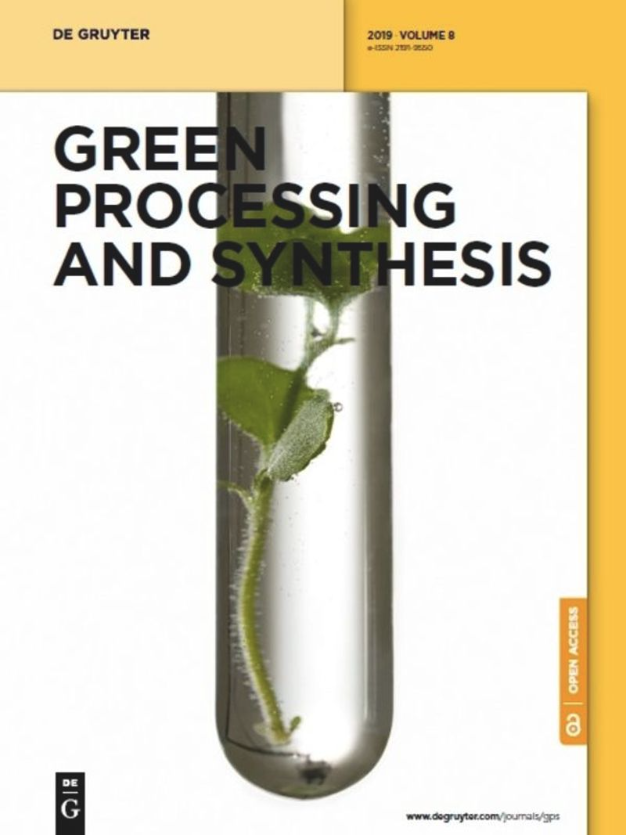Excellent photocatalytic degradation of rhodamine B over Bi2O3 supported on Zn-MOF nanocomposites under visible light
IF 3
4区 工程技术
Q2 CHEMISTRY, MULTIDISCIPLINARY
引用次数: 3
Abstract
Abstract In this article, Bi2O3@Zn-MOF hybrid nanomaterials were synthesized by supporting Zn-based metal–organic framework (Zn-MOF) through the hydrothermal method. X-ray diffractometer, Fourier transform infrared, scanning electron microscopy, energy-dispersive X-ray, N2 physisorption, X-ray photoelectron spectroscopy, and UV-Vis were used to characterize the physical and chemical properties of Bi2O3@Zn-MOF nanomaterials. The photocatalytic activity of the as-prepared hybrid has been studied over the degradation of rhodamine B (RhB). A catalytic activity of 97.2% was achieved using Bi2O3@Zn-MOF nanocomposite with the loading of 0.18 g Bi2O3, after 90 min of exposure to visible light irradiation, and the high photocatalytic performance was mainly associated with the nanorod structures, larger pore size, and broaden visible light absorption region due to the synergistic effect of the constituting materials. Furthermore, the Bi2O3@Zn-MOF nanocomposite can be reused three times and the degradation rate of RhB was maintained at 77.9%. Thus, the Bi2O3@Zn-MOF nanocomposite can act as a potential photocatalyst for the photodegradation of organic dyes in environmental applications.Zn-MOF纳米复合材料负载Bi2O3光催化降解罗丹明B的研究
摘要在本文中,Bi2O3@Zn-MOF采用水热法制备了以锌基金属-有机骨架(Zn-MOF)为载体的杂化纳米材料。利用X射线衍射仪、傅立叶变换红外光谱、扫描电子显微镜、能量色散X射线、N2物理吸附、X射线光电子能谱和紫外-可见光谱对Bi2O3@Zn-MOF纳米材料。研究了所制备的杂化物对罗丹明B(RhB)的光催化降解活性。使用Bi2O3@Zn-MOF负载量为0.18的纳米复合材料 g Bi2O3,90后 在可见光照射下暴露min,并且高光催化性能主要与纳米棒结构、较大的孔径以及由于组成材料的协同作用而加宽的可见光吸收区域有关。此外Bi2O3@Zn-MOF纳米复合材料可以重复使用三次,RhB的降解率保持在77.9%Bi2O3@Zn-MOF纳米复合材料可以作为一种潜在的光催化剂在环境应用中对有机染料进行光降解。
本文章由计算机程序翻译,如有差异,请以英文原文为准。
求助全文
约1分钟内获得全文
求助全文
来源期刊

Green Processing and Synthesis
CHEMISTRY, MULTIDISCIPLINARY-ENGINEERING, CHEMICAL
CiteScore
6.70
自引率
9.30%
发文量
78
审稿时长
7 weeks
期刊介绍:
Green Processing and Synthesis is a bimonthly, peer-reviewed journal that provides up-to-date research both on fundamental as well as applied aspects of innovative green process development and chemical synthesis, giving an appropriate share to industrial views. The contributions are cutting edge, high-impact, authoritative, and provide both pros and cons of potential technologies. Green Processing and Synthesis provides a platform for scientists and engineers, especially chemists and chemical engineers, but is also open for interdisciplinary research from other areas such as physics, materials science, or catalysis.
 求助内容:
求助内容: 应助结果提醒方式:
应助结果提醒方式:


